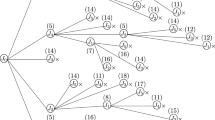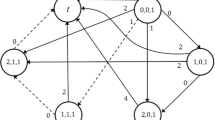Abstract
This paper addresses minimizing Tardy/Lost penalties with common due dates on a single machine. According to this penalty criterion, if tardiness of a job exceeds a predefined value, the job will be lost and penalized by a fixed value. The problem is formulated as an integer programming model, and a heuristic algorithm is constructed. Then, using the proposed dominance rules and lower bounds, we develop two dynamic programming algorithms as well as a branch and bound. Experimental results show that the heuristic algorithm has an average optimality gap less than 2 % in all problem sizes. Instances up to 250 jobs with low variety of process times are optimally solved and for high process time varieties, the algorithms solved all instances up to 75 jobs.










Similar content being viewed by others
Notes
Minimum Tardy/Lost Ratio
References
Baptiste P, Pape C (2005) Scheduling a single machine to minimize a regular objective function under setup constraints. Discrete Optim 2(1):83–99
Baptiste P, Sadykov R (2009) On scheduling a single machine to minimize a piecewise linear objective function: A compact MIP formulation. Naval Res Logist 56(6):487–502
Carrasco RA, Iyengar G, Stein C (2013) Single machine scheduling with job-dependent convex cost and arbitrary precedence constraints. Oper Res Lett 41(5):436–441
Chandra C, Liu Z, He J, Ruohonen T (2014) A binary branch and bound algorithm to minimize maximum scheduling cost. Omega 42(1):9–15
Chen B, Potts CN, Woeginger GJ (1998) A review of machine scheduling. In: Du DZ, Pardalos PM (eds) Handbook of combinatorial optimization. Kluwer Academic Publishers, Boston, pp 21–169
Cheng TCE, Ng CT, Yuan JJ, Liu ZH (2005) Single machine scheduling to minimize total weighted tardiness. Eur J Oper Res 165:423–443
Colin EC, Quinino RC (2005) An algorithm for insertion of idle time in the single-machine scheduling problem with convex cost functions. Comput Oper Res 32(9):2285–2296
Detienne B, Dauzère-Pérès S, Yugma C (2012) An exact approach for scheduling jobs with regular step cost functions on a single machine. Comput Oper Res 39(5):1033–1043
Engels DW, Karger DR, Kolliopoulos SG, Sengupta S, Uma RN, Wein J (2003) Techniques for scheduling with rejection. J Algorithms 49(1):175–191
Fathi Y, Nuttle HWL (1990) Heuristics for the Common due date weighted tardiness problem lIE. Transactions 22(3):215–225
Federgruen A, Mosheiov G (1994) Greedy heuristics for single-machine scheduling problems with general earliness and tardiness costs. Oper Res Lett 16:199–208
Kahlbacher HG (1993) Scheduling with monotonous earliness and tardiness penalties. Eur J Oper Res 64:258–277
Karakostas G, Kolliopoulos SG, Wang J (2009) An FPTAS for the minimum total weighted tardiness problem with a fixed number of distinct due dates. In: Ngo HQ (ed) Computing and combinatorics. Lecture Notes in Computer Science, vol 5609. Springer, Berlin Heidelberg, pp 238–248
Kellerer H, Strusevich VA (2006) A fully polynomial approximation scheme for the single machine weighted total tardiness problem with a common due date. Theor Comput Sci 369:230–238
Kethley RB, Alidaee B (2002) Single machine scheduling to minimize total weighted late work: a comparison of scheduling rules and search algorithms. Comput Ind Eng 43:509–528
Kianfar K, Moslehi G (2013) A note on “Fully polynomial time approximation scheme for the total weighted tardiness minimization with a common due date”. Discrete Appl Math 161(13–14):2205–2206
Kolliopoulos SG, Steiner G (2006) Approximation algorithms for minimizing the total weighted tardiness on a single machine. Theor Comput Sci 355(3):261–273
Koulamas C (2010) The single-machine total tardiness scheduling problem: Review and extensions. Eur J Oper Res 202(1):1–7
Lawler EL (1964) On scheduling problems with deferral costs. Manag Sci 11(2):280–288
Lawler EL, Moore JM (1969) A functional equation and its application to resource allocation and sequencing problems. Manag Sci 16:77–84
Lenstra JK, Rinnoy-Kan AHG, Brucker P (1977) Complexity of machine scheduling problems. Ann Discrete Math 1:343–362
Leung JYT (2004) Minimizing total weighted error for imprecise computation tasks and related problems. In: Leung JYT (ed) Handbook of scheduling: algorithms models and performance analysis. CRC Press, Boca Raton, pp 3416–3431
Pinedo M (1995) Scheduling: theory algorithms and systems. Prentice Hall, New Jersey
Potts CN, Van Wassenhove LN (1992a) Approximation algorithms for schrduling a single machine to minimize total late work. Oper Res Lett 11(5):261–266
Potts CN, Van Wassenhove LN (1992b) Single machine scheduling to minimize total late work. Oper Res 40(3):586–595
Shabtay D (2008) Due date assignment and scheduling a single machine with a general earliness/tardiness cost function. Comput Oper Res 35:1539–1545
Shabtay D, Gaspar N, Kaspi M (2013) A survey on offline scheduling with rejection. J Sched 16(1):3–28
Slotnick SA (2011) Order acceptance and scheduling: A taxonomy and review. Eur J Oper Res 212(1):1–11
Sterna M (2011) A survey of scheduling problems with late work criteria. Omega 39:120–129
Yuan J (1992) The NP-hardness of the single machine common due date weighted tardiness problem. Syst Sci Math Sci 5:328–333
Zhou X, Cai X (1997) General stochastic single-machine scheduling with regular cost functions. Math Comput Model 26(3):95–108
Author information
Authors and Affiliations
Corresponding author
Additional information
Communicated by Ernesto G. Birgin.
Appendix
Rights and permissions
About this article
Cite this article
Kianfar, K., Moslehi, G. & Nookabadi, A.S. Exact and heuristic algorithms for minimizing Tardy/Lost penalties on a single-machine scheduling problem. Comp. Appl. Math. 37, 867–895 (2018). https://doi.org/10.1007/s40314-016-0370-4
Received:
Revised:
Accepted:
Published:
Issue Date:
DOI: https://doi.org/10.1007/s40314-016-0370-4
Keywords
- Scheduling
- Tardy/Lost penalty
- Integer programming
- Heuristic algorithm
- Branch-and-bound algorithm
- Dynamic programming




